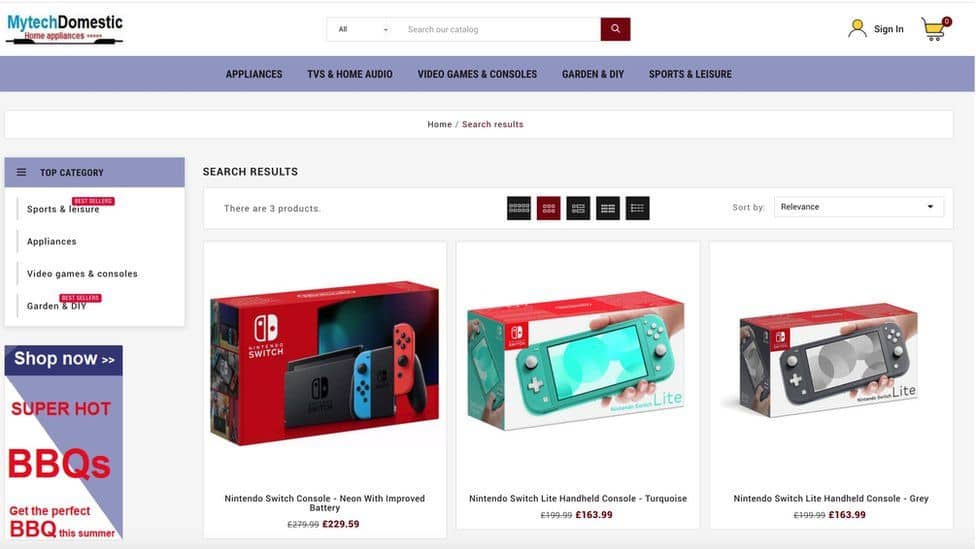Getty Images/BBC Google has failed to stop “shyster” websites advertising on its search engine, despite promising to fix the problem, the BBC has found. Adverts for unofficial services selling government documents such as travel permits and driving licences are against Google’s own rules.
But the BBC found adverts for expensive third-party sellers every time it searched during a 12-month period.
In a statement, Google said it had taken down billions of rule-breaking adverts.
What is the issue?
In the UK, changing the address on your driving licence is free – but Google consistently showed adverts for services charging £49.99.
In Google’s search results, adverts look similar to organic results and appear at the top of the list.
Websites like these are not illegal and customers may still get the documents for which they have applied.
However, some of the companies charge more than five times the amount that the official websites do.
“They are not scams, they’re shysters,” said Martin Lewis, founder of the website Money Saving Expert.
“They’re not stealing your money, they’re charging you a fee for something that is completely pointless.”
Some justify their prices by offering support to anybody struggling with an application.
Advertising such services is against Google’s own policies.
What did the investigation find?
In October 2018, the BBC brought several adverts to Google’s attention that broke its rules.
A month later, Google told the BBC it had developed a machine learning system that could prevent the adverts appearing again.
At the time, it only banned adverts for third-party services that charged more than the official government website.
However, in May 2020 it changed its policy to ban “adverts for documents and/or services that can be obtained directly from a government or a delegated provider” including “offers of assistance to obtain these products or services”.
Since that change, the BBC has repeated the same set of Google searches on seven separate occasions over a 12-month period.
Why hasn’t Google fixed the problem?
“Machine learning is very good when you have a clear target in mind,” said Prof Sandra Wachter, from the Oxford Internet Institute.
But trying to catch rule-breakers is a game of “cat and mouse”, as the companies can change their tactics and reappear.
“Consumers trust Google. There is an expectation that what is happening on Google is legitimate,” said Prof Wachter.
“If they know there are certain problems out there, they need to take more precautions.”
- Facebook and Google ‘failed to remove scam adverts’
- Suspected scam gadget store topped Google results
Travel permit adverts are not the only ones slipping through Google’s systems.
Earlier in April, news website This Is Money set up a fake online investment company and was able to advertise it on Google.
In May 2020, the BBC found a suspected scam store had topped Google’s search and shopping results for weeks, encouraging customers to pay for tech via direct bank transfer.
What has Google said?
In a statement, Google said: “We have strict policies that govern the types of ads and advertisers we allow on our platforms. We only allow governments or their delegated providers to advertise for official documents or services.”
It said it used machine learning and human reviewers to spot problems, and had removed 3.1 billion adverts that violated its policies in 2020.
In addition, it started to verify advertisers on its platforms in January 2021.
The moral of the story!
You can’t be too careful! As they say, if it looks too good, it probably is, and every care should be taken before jumping in for that bargain.
Ads like the above don’t only appear in Google search results but also on other platforms like Facebook & Twitter. ‘Bargain’ offers are seen far too off advertising the most recent fad or ‘special’ product.
And, they often appear to be a ‘good’ deal but…
There are a number of things you can check, some quite simple and others a bit more technical and might need a bit more knowledge. If you click through to the site:-
- Check if they display a physical address and not only an email contact
- Check if they can be contacted by telephone
- Check where they are located (if you can)
- Check how long the domain eg amazon.co.uk has been registered (often you will find it is only a few months old)
- Do a search for the product online (you will often find it is ridiculously cheap or even more expensive than other more recognisable outlets)
Click here to view original article at: Why can’t Google get a grip on rip-off ads?


